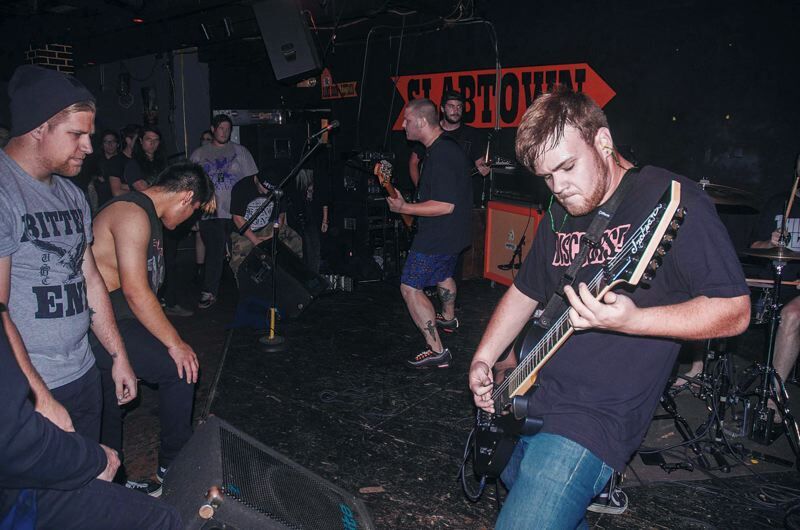Slabtown, iconic outpost for live music, closes
Published 12:00 am Thursday, November 6, 2014

- In the final days of Slabtown, the band Cross Me, from Milwaukee, Wis., and guitarist Jimmy LaDue, right, rocked the house. Die-hard fan are trying to raise money to keep Slabtown open.
When Doug Rogers was 14 in the 1980s and living outside of San Jose, Calif., he was a target.
Trending
“I got beaten with a PVC pipe for having a strange haircut,” he says with a slight chuckle. “I was leaving a mall and someone yelled ‘Hey faggot’ and a truckload of guys pulled over and chased me into a construction site and beat me.”
Puffing on a smoke the night of Nov. 1 outside Slabtown, the club he owns, Rogers says when he bought the place in February 2012, he wanted to serve folks like his 14-year-old outcast self.
“I never felt like I belonged,” he says, sporting a graying mohawk. “And I wanted to create a place where people who feel like they didn’t belong felt safe.”
Trending
That place, he says, was Slabtown, which has shut its doors for now, due to financial difficulties. The famed rock ‘n’ roll club, host to numerous garage rock, punk, hardcore and other shows over the years, became a home to LGBTQ people, women rockers and other groups sometimes marginalized even in reputedly liberal Portland.
However, running a club that hosts numerous all-ages shows, including the Sunday all-ages series The Church of Rock ‘n’ Roll, meant eschewing the kind of dollars other clubs made by sticking to 21-and-older shows, he says.
“I’ve been putting Band-Aids on our finances for the last year and a half,” Rogers says.
A group of people affiliated with the club has been working on a campaign to raise the amount Rogers would need to keep it open, at gofundme.com/SaveSlabtown.
“Although I fully support the campaign, I am not directly affiliated with it, and I have ensured that should the campaign fall short of its $50,000 goal, that all funds be returned to (donors),” Rogers says.
He doesn’t hold out much hope for Slabtown reopening under his ownership, but says it may be bought and reopened with him in its employ.
“I’ll likely be driving a cab,” he adds. “I’ve got to get myself out of personal debt as well.”
Something for everyone
Two young folks Rogers mentored at Slabtown were Trevor Johnson, 21, and Katie Ofenstein, 20. Bookers and promoters, Johnson helped organize the volunteer-run Church of Rock ‘n’ Roll shows and Ofenstein organized weekly Yes Homo nights to showcase queer DJs, bands, art and comics.
Both promoters say Slabtown’s closing saddens them. Ofenstein says Slabtown’s location at 1033 N.W. 16th Ave. kept it off the beaten path of a lot of music fans, and the bar did not generate enough business outside its music nights.
“Although our shows were really, really successful, it’s not enough to keep it afloat,” she says.
Johnson says he was “super-bummed” when he learned Slabtown would close. The bar was one of the few places where you could hear a hardcore band one night, followed by an acoustic singer-songwriter the next, he says. Most importantly, people who didn’t feel safe in other venues, where more violent or aggressive performers might play, felt safe at Slabtown, he says.
“It doesn’t matter if you have the coolest patches on your back or how your hair stands,” he says. “We’re all in this together, and we’re all in agreement.”
Rogers adds that the Church of Rock ‘n’ Roll had “services,” including readings from rockers’ bios or books about such movements as riot grrrl. The “services” would include the passing of a communion cup, filled with coffee, Rogers says, noting it was one of his favorite parts of working at Slabtown.
“I think it was a sense of belonging that I rarely experienced at shows,” says Rogers, who plays bass in the punk band Red Shadows. “It was a sense of being part of something larger than yourself.”
Final sets
Outside on the street, punks and rockers, stoners and jean-jacketed misfits of all kinds share smokes and debate everything from whom Jesus was meant to save to how you should break a guy’s arm in a mixed martial arts match.
Inside, as the night wears on, a variety of rockers at Slabtown cover songs by dead musicians or bands with dead members.
The Gnash blaze through an Elliott Smith set. Another band called Symptoms turns in a killer set of Clash tunes. Ofenstein plays Joy Division’s dead singer Ian Curtis to Love and Caring (who cover Joy Division/New Order).
“It was surreal,” Ofenstein says after Love and Caring’s set, which draws whoops and hollers. “Definitely emotional. But I had a lot of fun.”
In between the raucous sets, the club is a din of happy noise, the celebratory atmosphere masking the fact that it all will be over soon. Men in mohawks hug women in Halloween costumes. A gray-haired guy rocks out with his underage son, and Rogers wanders about hugging just about everyone.
Hardcore band The Young Turks perform a Bruce Springsteen set in honor of the Boss’ late saxophone player Clarence Clemons. In one of those moments that can only happen on a night like this, the underground crowd’s members lustily sing song after song written by the mainstream’s most popular chronicler of the marginalized. The crowd knows every word to every tune and starts moshing to Springsteen’s folksy ballad “Atlantic City.” In the context of the gritty nightclub’s closing, Springsteen’s lines make perfect sense — maybe the most sense of all of the words sung from the stage tonight.
“Everything dies, baby that’s a fact/But maybe everything that dies, someday comes back.”







